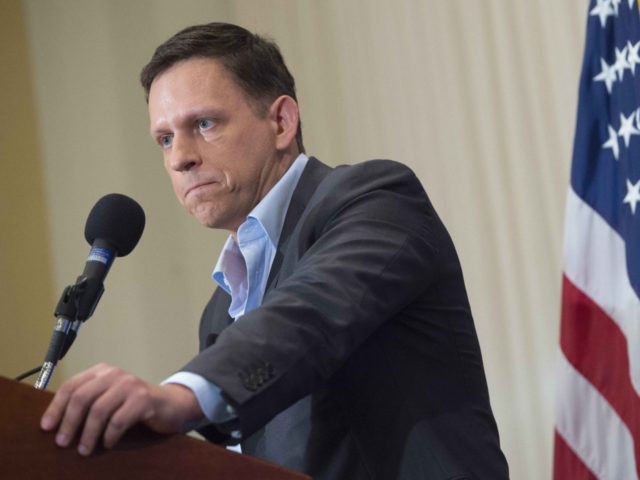My friend and former law professor Jedediah Purdy has published an attack at Politico, “The Anti-Democratic Worldview of Steve Bannon and Peter Thiel,” targeting President-elect Donald Trump’s chief adviser and major tech backer, respectively.
(Bannon is currently on leave as Executive Chairman of Breitbart News.)
Purdy is a deep thinker with a commitment to democratic values, so any critique he writes deserves to be taken seriously. However, this one is a solipsistic effort that projects views onto Bannon and Thiel before collapsing into left-wing agitprop.
At the outset, Purdy declares “Trumpism” to be “an illiberal theory of politics with deep doubts about democracy.” His proof? A 2014 speech given by Bannon at the Vatican, whose chief flaw — as Purdy sees it — is that Bannon defends “capitalism” and “Judeo-Christian” values but does not discuss “democracy” or “constitutionalism.” That is it.
Into that blank space, Purdy pours his own prejudices. Maybe — just maybe, mind you — Bannon doesn’t like democracy:
What does it mean that Bannon doesn’t talk about democracy or constitutionalism? Maybe he just forgot. But it seems more likely that his nationalist capitalism is an alternative theory of political legitimacy, and one whose emergence doesn’t necessarily depend on the machinery of democracy.
Later, Purdy does it again, arguing that because “Bannon gives no hint that the populist wave is a call for deepened democracy,” he must be arguing for the opposite.
And here Purdy begins to give the partisan game away. As examples of “deepened democracy,” he suggests “expanding political participation for working people and the marginalized (rather than embracing an anti-union agenda and vote-suppression laws).”
Viewed from another perspective, that “anti-union agenda” is actually a way of rolling back the aristocratic labor privileges that some unions have secured for their own members at the expense of the working poor and unemployed. And so-called “voter-suppression laws” — widely favored by the minority groups they are ostensibly discriminating against — is a way of preserving democracy, protecting the individual right to vote against disenfranchisement through fraud. (For that reason, photo ID at the polls is standard practice in nearly every major democracy in the world, including many poor countries.) Purdy cannot see past his own partisan lenses; there is only one way of “deepening democracy,” and it happens to favor Democrats.
In every such attack, there must be an accusation of racism, and Purdy finds a subtle way of making it, suggesting that Bannon’s populism is aimed at excluding certain groups of people — those who, Purdy says, do not fit the definition of “hard-working Americans,” although he gives no citation or reference to Bannon having used that phrase, certainly not in the way he suggests.
“Hard-working Americans” is an interesting phrase. It is one that Hillary Clinton used in 2008, in an explicitly racial attempt to defend her flagging primary campaign, citing a poll “that found how Senator Obama’s support among working, hard-working Americans, white Americans, is weakening again, and how whites in both states who had not completed college were supporting me.” The fact that her hackneyed pantomime of populism happened to be racist does not make racists out of other people who happen to believe authentically in the value of hard work.
Purdy concludes that for Bannon, “those who pledge allegiance to the state — in their speech and actions — are economically and politically privileged.” There is nothing in Bannon’s Vatican speech — or, indeed, anywhere — to suggest that he holds the state above the nation, or above the constitution, or above the people. Purdy has simply invented that.
Moving on to Thiel, Purdy tries the same trick — noting some kind of gap in Thiel’s public comments, and filling it with what he wants to attack. Here, Purdy wonders what made Thiel move beyond his skepticism of politics several years ago, and become a passionate advocate for Trump’s candidacy.
“Whatever Thiel’s motive, there is no sign that it is a new enthusiasm for democracy.” And therefore, apparently, it is safe to assume that Thiel is anti-democratic.
“If you can’t escape the democratic herd, then maybe you can manage it on its own irrational terms. If politics is essentially demagoguery, then what a libertarian needs is a skillful and congenial demagogue,” Purdy says.
He goes on: “That sounds like ‘managed democracy,’ the standard euphemism for Vladimir Putin’s style of governing Russia.” Yes — and that sounds rather clumsily like the Hillary Clinton campaign’s talking points, which attempted to peg Trump as the next Putin, even after Clinton herself championed the disastrous “reset” policy with Russia.
Purdy concludes by pretending that he has in fact proven the projections that he introduced earlier as mere questions, or conjectures. “Does the president-elect espouse the anti-democratic beliefs that Bannon and Thiel have demonstrated?” he asks. “Demonstrated” is the word he chooses — though he has demonstrated nothing but his own prejudices.
There is, perhaps, an enlightened discussion to be had about the tension between populism and constitutionalism, or between technocracy and democracy. But that is a discussion Purdy would rather defer, in favor of casting about inflammatory accusations like “anti-democratic.”
While it is refreshing to see the left suddenly worry about illiberal democracy, after eight years of applauding Barack Obama’s anti-constitutional behavior, the minimum that we ought to expect of that debate is that it be conducted on the basis of truth.
Joel B. Pollak is Senior Editor-at-Large at Breitbart News. His new book, See No Evil: 19 Hard Truths the Left Can’t Handle, is available from Regnery through Amazon. Follow him on Twitter at @joelpollak.

COMMENTS
Please let us know if you're having issues with commenting.